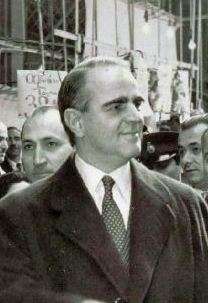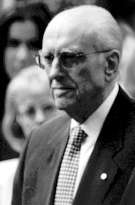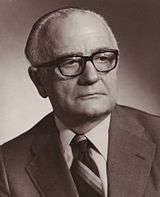Greek legislative election, 1977
Greek legislative election, 1977

|
|
|
|
All 300 seats to the Greek Parliament
151 seats were needed for a majority |
| |
First party |
Second party |
Third party |
| |
 |
 |
 |
| Leader |
Constantine Karamanlis |
Andreas Papandreou |
Georgios Mavros |
| Party |
ND |
PASOK |
EDIK |
| Leader since |
4 October 1974 |
3 September 1974 |
1974 |
| Last election |
220 seats, 54.37% |
12 seats, 13.58% |
– |
| Seats won |
171 |
93 |
16 |
| Seat change |
 49 49 |
 81 81 |
– |
| Popular vote |
2,146,365 |
1,300,025 |
612,782 |
| Percentage |
41.84% |
25.34% |
11.95% |
| Swing |
 12.53% 12.53% |
 11.76% 11.76% |
– |
|
|
|
Parliamentary elections were held in Greece on 20 November 1977.[1] After Prime Minister Constantine Karamanlis called for early elections, his New Democracy party suffered a significant loss of power. However, Karamanlis managed to secure an absolute majority in the Parliament. The big surprise was the success of PASOK, whose socialistic rhetoric remained radical. Because of PASOK's success, the Centrists (Union of the Democratic Centre, ΕDIK, former Center Union - New Forces) led again by Georgios Mavros lost half of their power. As a result, Andreas Papandreou, PASOK's leader, became a prominent figure in Greek politics. The Communists (Communist Party of Greece) and the Nationalists managed to amplify their support.
Future Prime Minister of Greece, Antonis Samaras first won a seat in parliament at this election.
Results
| Party |
Votes |
% |
Seats |
+/– |
|---|
| New Democracy (ND) | 2,146,365 | 41.8 | 171 | –49 |
| Panhellenic Socialist Movement (PASOK) | 1,300,025 | 25.3 | 93 | +81 |
| Union of the Democratic Centre (EDIK) | 612,786 | 11.9 | 16 | +16 |
| Communist Party of Greece (KKE) | 480,272 | 9.4 | 11 | – |
| National Alignment (EP) | 349,988 | 6.8 | 5 | New |
| Progress and Left Forces Alliance | 139,356 | 2.7 | 2 | – |
| Party of New Liberals | 55,494 | 1.1 | 2 | New |
| Revolutionary Communist Movement of Greece (EKKE) | 11,895 | 0.2 | 0 | 0 |
| Popular Democratic Unity | 8,839 | 0.2 | 0 | New |
| EDE-Trotskyists | 1,032 | 0.0 | 0 | New |
| Hellenic Christian-Social Union | 777 | 0.0 | 0 | New |
| Communist ORganisation "Fighter" | 321 | 0.0 | 0 | New |
| Labour-Agricultural Party of Greece | 170 | 0.0 | 0 | New |
| Farmer Smoke-Producers Party | 84 | 0.0 | 0 | New |
| Olympic Democracy | 19 | 0.0 | 0 | New |
| Independents | 22,348 | 0.4 | 0 | New |
| Invalid/blank votes | 64,120 | – | – | – |
| Total | 5,193,891 | 100 | 300 | 0 |
| Registered voters/turnout | 6,403,738 | 81.1 | – | – |
| Source: Nohlen & Stöver |
| Popular vote |
|---|
|
|
|
|
|
| ND |
|
41.84% |
| PASOK |
|
25.34% |
| EDIK |
|
11.95% |
| KKE |
|
9.36% |
| EP |
|
6.82% |
| SPAD |
|
2.72% |
| Others |
|
1.97% |
| Parliament seats |
|---|
|
|
|
|
|
| ND |
|
57.00% |
| PASOK |
|
31.00% |
| EDIK |
|
5.33% |
| KKE |
|
3.67% |
| EP |
|
1.67% |
| SPAD |
|
0.67% |
| Others |
|
0.67% |
Aftermath
In 1979 Greece became European Community's 10th member, despite the opposition of PASOK and the Communists. In 1980, Constantine Karamanlis succeeded Constantine Tsatsos as President of the Republic. George Rallis became Prime Minister and new leader of ND.
References
- ↑ Nohlen, D & Stöver, P (2010) Elections in Europe: A data handbook, p830 ISBN 978-3-8329-5609-7


